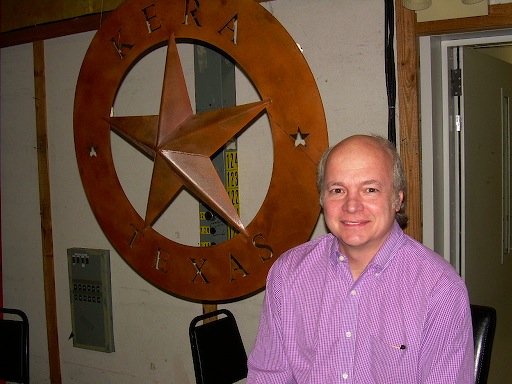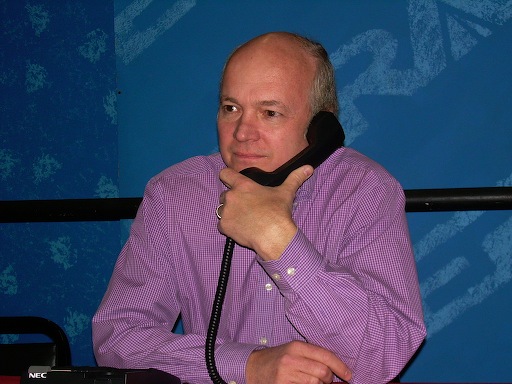Forever Young at KERA? He's still got his eyes on the programming ball
03/25/08 03:48 PM

By ED BARK
His sheer number of PBS pledge drives -- now in the neighborhood of 100 -- qualify Bill Young for an endurance medal that's yet to be minted.
He laughs about those but is too unassuming to mention that he's won two national PBS Programmer of the Year awards during nearly three decades at Dallas-based KERA-TV (Channel 13).
Young rarely calls attention to himself, is shy about having his picture taken and actually seems to mean it when saying, "If you're going to be in television, you want to be in something that's going to make a difference. It's still unbelievably gratifying to hear people say the next day how much a program meant to them. You usually don't get that with an episode of Home Improvement."
His tastes aren't all rarefied, though. He seldom misses an episode of Fox's Family Guy, owns a talking/dancing Mark Cuban doll proudly displayed in his office and is a co-producer of Historic Pubs of Dublin, which aired earlier this month during pledge drive. And perhaps his proudest possessions are No. 5 Young jerseys from three baseball fantasy camps.
"It's the only thing I ever found that I could do for a week and never think about television," he says from a workplace crowded with TV kitsch and sports memorabilia, including a well-worn grandstand seat from Chicago's old Comiskey Park.
Young, 53, grew up in Dallas, graduated from W.T. White High School and received a B.S. in advertising from the University of Texas at Austin before making his way from Wichita Falls' CBS affiliate to KERA in late 1978.
He began as a "traffic director," which could have but didn't include parking cars.
Young instead lugged around bulky two-inch programming tapes, typed out programming logs and eventually got a chance to mastermind KERA's midnight to 8 a.m. programming bloc. He became the station's full-time programming director in 1988 and got the requisite vice president title to go with it in October 2000.
"I grew up watching all the TV stations in town," he says. "It's still a difficult market to get a read on what people will watch."
He's seldom erred on the side of timidity, repeatedly testing D-FW's tolerance -- or intolerance -- for boundary-pushing programming.
Early in his tenure, KERA aired an unedited version of the 1990 documentary Tongues Untied under public television's P.O.V. series banner. Artist Marlon Riggs, a gay black man from Fort Worth, told his story directly to the cameras, using a grand total of 41 f-words in the process.
Many PBS stations ran either a heavily edited version or ran away from the film entirely.
"But there was never a question of whether we should run that show here," says Young. "And without the language, you'd lose the whole point of the show."
KERA received between 3,000 and 4,000 phone calls on Tongues Untied, he recalls, with a good percentage of them supporting the station's decision to show the program au natural.
Over the years, KERA also has aired unedited versions of Tales From the City, Moll Flanders, profanity-pocked World War II documentaries and a 2003 PBS production of The Gin Game, in which stars Mary Tyler Moore and Dick Van Dyke used the Pulitzer Prize-winning play's oft-graphic language to its fullest.
Before Young arrived, KERA went all the way with a 1973 production of Steambath. And the station was the first in the U.S. to broadcast Monty Python's Flying Circus, whose reliably adult humor hit D-FW in May 1975 via a bold decision by then vice president of programming Ron Devillier. He had an ally in KERA president Bob Wilson, father of actors Luke and Owen Wilson.
It's a lot tougher now. The Federal Communications Commission, in its crackdown on so-called "indecency," has given stations little guidance on what's acceptable and what isn't during the "safe harbor" hours of 6 a.m. to 10 p.m. (central).
Tales of the City received "no complaints at all" from viewers when KERA first showed it in prime-time 15 years ago, Young recalls. But it "would be very difficult to rebroadcast today prior to 10 p.m.," he says. "You just don't know beforehand whether it will be 'objectionable.' All it takes is one complaint (to the FCC). And the fines right now are anywhere between $300,000 to $500,000 per offense. So you sit here as a programming person and ask, 'Do I want to risk that fine?' "

In any era, though, most public television programming doesn't need a content cop. And KERA has had its share of quality local productions over the years, its trailblazing Newsroom program with Jim Lehrer and the With Ossie and Ruby anthology drama series from 1980-82.
Conceived by husband and wife actors Ossie Davis and Ruby Dee, the series premiered just after Young joined the station. KERA studios also were home base for the subsequent Here's To Your Health series, hosted in part by the esteemed John Houseman.
The station later played a major role in co-producing the acclaimed 1991 LBJ biography for PBS' American Experience series. And it painstakingly raised funds throughout much of the 1990s before finally mounting the four-hour nationally televised production of U.S.-Mexican War in 1998.
Fundraising seems to be a steeper uphill climb each year, though, prompting KERA to double its number of annual pledge drives from two to four during Young's tenure. Its productions now tend to be appreciably more local in scope, including the ongoing weekly "topic-driven interview program" Think with Krys Boyd, and specials such as A Conversation with Bill Clements (the former Texas governor) and 2003's JFK: Breaking the News.
"It's become increasingly difficult to get younger people to give you money," Young says. "We've gone from a generation that gave to public television because it was the thing to do to a generation of 'What am I gonna get in return?' "
Pledge drives in turn have become "more transactional" over the years, with companion DVDs, CDs, books and concert tickets offered to new and renewing station members.
Sometimes you have to swallow hard. Lawrence Welk specials were popular for years, even though the champagne music maker didn't seem like an optimum fit for public television. An Osmond family reunion made the cut during KERA's latest pledge drive. Multiple Riverdance and doo-wop outings also have proven to be very potent fundraisers. And most latter day pledge drives have included at least one showing of A Black and White Night, the star-studded Roy Orbison tribute concert that premiered in 1988 on the Cinemax cable network.
"I think we've run the course of every band that's either still playing together or getting back together, other than Led Zeppelin," Young says. "I'm still trying to get that. We pretty much have to reinvent the wheel with each pledge drive."
Over the years, Young also has become an acknowledged go-to expert on British comedies. He's co-produced five specials on the genre in partnership with former KERA executive Mike Seymour and Iowa Public Television. Recent efforts include Fawlty Towers Revisited and The Funny Ladies of British Comedy.
Young has had offers from rival PBS stations, but seems entrenched both at KERA and in his birthplace. Yet he's still young enough in mind and body to keep playing softball and to go Irish pub crawling with famed author Frank McCourt in the service of that aforementioned pledge special.
"Of course that was all for the viewers," he says of his first brushes with Guinness the way it's meant to be.
No one's likely to begrudge him.
